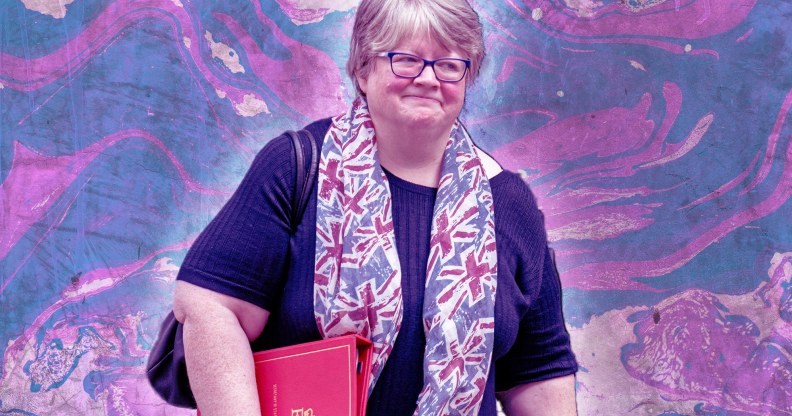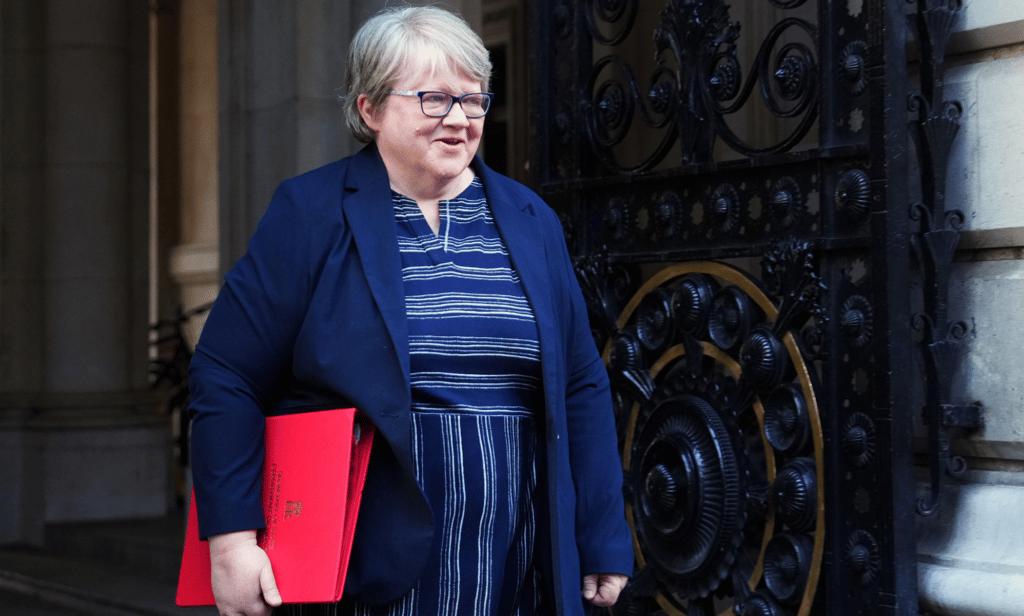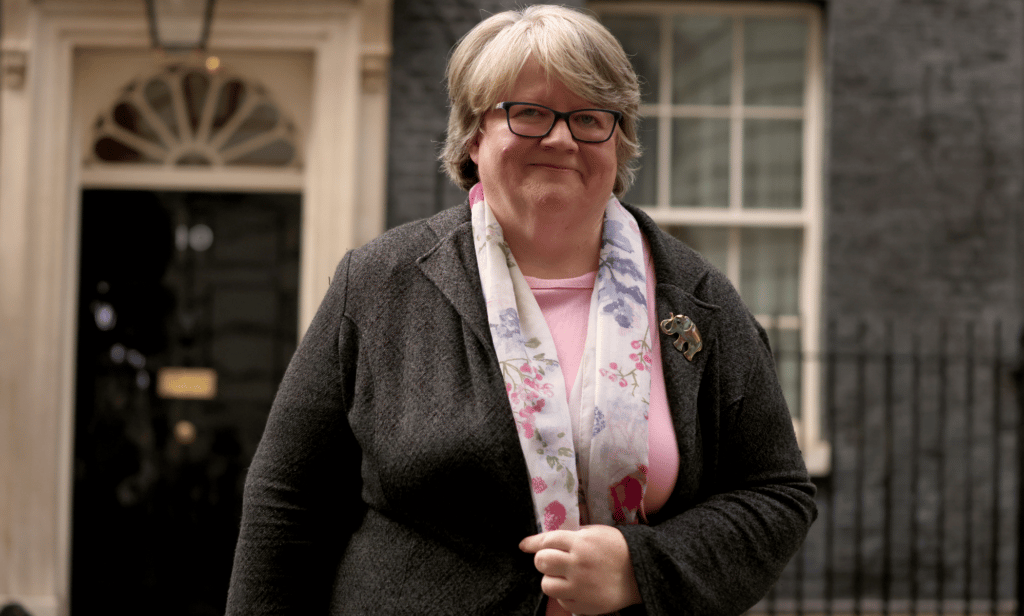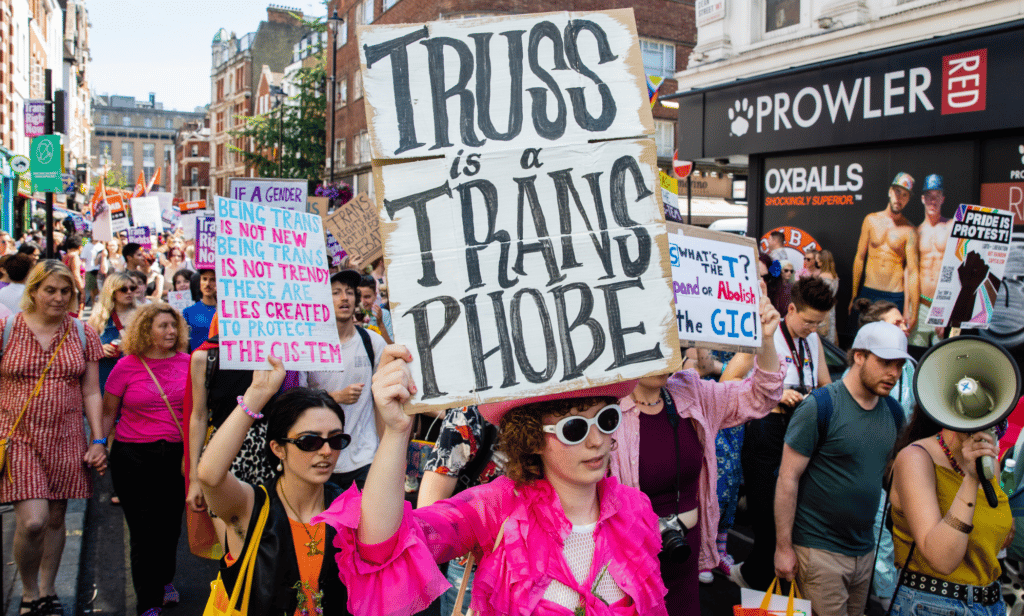New health secretary Thérèse Coffey urged to take monkeypox and LGBTQ+ healthcare seriously

Therese Coffey. (Getty)
Thérèse Coffey is being urged to build bridges with the LGBTQ+ community – and to take serious steps to squash monkeypox.
Coffey was named deputy prime minister as well as health and social care secretary in the first wave of appointments for Liz Truss’s cabinet on Tuesday (6 September).
The Suffolk Coastal MP is the third person to hold the health portfolio this year after Sajid Javid, who stepped down in July, and Steve Barclay, who replaced him.
A close ally of Truss, Coffey’s right-wing record is littered with strong anti-abortion views and history of repeatedly voting against LGBTQ+ rights – including same-sex marriage.

Thérèse Coffey – the Tory government’s new deputy prime minister and secretary of state for health and social care – has a long right-wing voting track record. (Getty)
Coffey must take ‘urgent action’ on monkeypox
Among her most pressing responsibilities is the ongoing monkeypox outbreak.
Despite widely-held concerns among the LGBTQ+ community about Coffey’s track record, sexual health services are not prepared to write Coffey off just yet – many believe she should be given a fair crack of the whip, and they hope she can change the government’s troubled course on monkeypox.
“We need urgent action on monkeypox from the new health secretary,” said Danny Beales, head of policy and campaigns at the National AIDS Trust.
“The outbreak has so far not had the resources and attention it needs. We have the tools to vaccinate, test and treat people with monkeypox, so people are suffering unnecessarily.”
Sexual health services are being “derailed” because they’re having to divert most of their resources into handling the monkeypox outbreak, Beales said.
“So far, they have received zero additional funding and are having to cancel appointments and restrict PrEP,” he said.
“They need additional funding and support. If action isn’t taken urgently, we will see more people diagnosed with HIV and monkeypox unnecessarily.”

LGBTQ+ men have been predominantly impacted by the monkeypox outbreak. (Getty/PinkNews)
Katie Clark, policy and public affairs officer at the Terrence Higgins Trust, said the monkeypox outbreak “hasn’t been treated with the seriousness it requires” by the government so far.
“There’s expected to be a second shipment of vaccines arriving in the UK at the end of the month, so what we really need to see is that the vaccine rollout is better coordinated, better advertised and better organised than what we saw earlier in the summer,” Clark said.
“There’s an opportunity for the health secretary to lead on that and make sure we’re getting the vaccine to people who need it.”
Professor Matt Phillips of BASSH (British Association for Sexual Health and HIV) agrees, adding: “It’s a very difficult time in the NHS post COVID and with a recession looming. What I would hope is that whatever past records are, there’s a clean sheet now for her to give given a good chance at it.”
It’s still not too late for this government to start to repair the damage done
Cleo Madeleine, communications officer for Gendered Intelligence, told PinkNews Thérèse Coffey’s appointment “despite her public and ongoing opposition to marriage equality is a disastrous look for the new cabinet”.
“It is hard to see how a minister who so freely and openly opposes LGBT+ rights could possibly be entrusted with much-needed improvements to HIV and AIDS care, sexual health, screening services and other healthcare issues that disproportionately affect the community,” she said.
“She has also made no secret of her anti-abortion stance and, as work and pensions secretary, attempted to suppress reports of deaths caused by Tory welfare cuts.”
As health secretary, Thérèse Coffey will likely soon need to take a view on the state of the UK’s gender-affirming healthcare. She’s not aired any opinions on the topic, or trans rights more generally, in the past.

Madeleine noted that trans healthcare services in England are “already being expanded and updated in response to recommendations from the Cass Review”, with NHS England set to replace its sole youth gender clinic with a series of regional centres.
It would be a “costly and counterproductive move” for Thérèse Coffey to “obstruct this progress”, Madeleine noted.
“More pressingly, if the new prime minister is to have any credibility her cabinet must rebuild the bridges with the LGBT+ community – and particularly the trans community that [outgoing PM] Boris Johnson burned,” Madeleine said.
“Coffey’s voting record is cause for serious concern, but it’s still not too late for this government to start to repair the damage done.”
Johnson’s Tory government came to loggerheads with the LGBTQ+ community
Relations between the Tory government and the LGBTQ+ community are incredibly fraught in the wake of Boris Johnson’s time in office.
With Priti Patel as home secretary, he cultivated an increasing hostility towards LGBTQ+ asylum seekers. Johnson’s equalities minister, and successor as prime minister, Liz Truss scrapped reforms to the Gender Recognition Act.
Truss also had responsibility for banning conversion therapy – but after multiple delays Johnson took the issue out of her hands and decided that trans people wouldn’t be protected by the proposed legislation.
He claimed a trans-inclusive conversion therapy ban wasn’t possible because there are “complexities and sensitivities” around gender identity. Johnson also argued it’s a “sensible option” for trans women to be excluded from women’s sports.
His time in office was increasingly fuelled by anti-trans rhetoric towards the end, with dog-whistles about ‘basic biology’ even cropping up during PMQs.
Given Truss’ involvement in the previous government and her own history of anti-trans rhetoric – including when she said trans women aren’t women during a leadership hustings – expectations are low.

Boris Johnson frequently used anti-trans rhetoric during his time as prime minister, and Liz Truss used comments attacking the trans community during the Tory leadership election. (Getty)
TransActual managing director Helen Belcher said most trans people are “incredibly apprehensive” about Truss as prime minister.
“We are all too aware of her statements on wanting to ‘protect women’s spaces’,” Belcher said. “These are little more than code for excluding trans people from public life.”
Belcher urged the new prime minister to “govern for everyone” instead of pandering to “hatred and bigotry” like her predecessors.
“We hear that she has been fighting for a fully inclusive ban on conversion practices, and that she is supportive of new NHS services,” Belcher said. “But we need to be reassured by active statements of support, rather than being expected to be placated by silence.”

